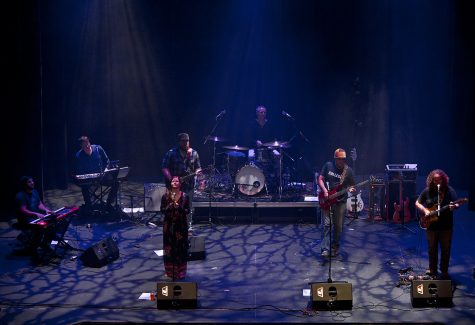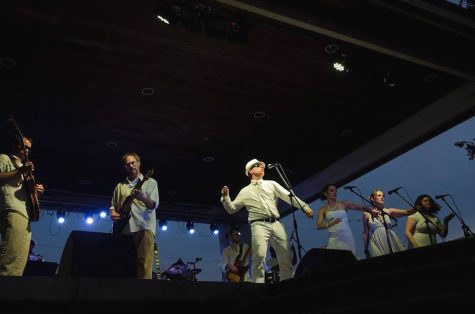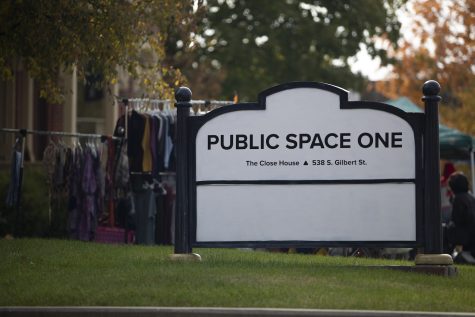Ballad of a Tribute Band: The shared love of past artists unites musicians
Jazz fusion, classic rock, and emo rap — the sounds of three Iowa City tribute bands vastly differ, but they all share the same love and respect for the musicians they emulate.
November 14, 2019
The stage glowed under the venue lights, the humming of the crowd grew louder as the start of the concert drew near. Fans from all walks of life came to see artists try and replicate a sound from a bygone era, all in the hopes to honor those that came before them.
Tribute bands bring large-scale artists to small-scale venues and events, letting people listen in on what they may have never have gotten a chance to hear played live otherwise. Many of these tribute bands are the closest attendees will ever get to witnessing the original artist perform live.
Countless musicians have shown their respect for renowned artists of the past in the form of tribute bands, and Iowa City is no stranger to these devotees.
The creators of three local tribute bands are unique in origins, style, and genres, but their core similarity is the respect and admiration they have for the artist they imitate. Steely Dan tribute band, The Fez; Grateful Dead band, Winterland; and Lil Peep tribute band, Lil Weep, are bands with distinct sounds,
These bands take the stages of clubs, festivals, and concert halls all over the Midwest, drawing crowds of both newcomers and die-hard fans. However, the warmth that is given off by the stage lights is minor compared to the wave of warmth that is given from the intimate audience that gathers around the stage.
But the band’s marvel for music is trumped by any notion of kitschy tropes. Looking like the band wasn’t that important for Jeremiah Murphy, co-founder and bassist for The Fez.
“We weren’t always big on [looking like Steely Dan], but sounding like them was the utmost importance, at least to me,” Murphy said. “And that’s why I would take the recordings to the rehearsals and scrutinize, and make notes, and tell everybody that this is really what needs to happen to sound like this, and we have to sound like this. Otherwise, this isn’t going to last very long.”

The Fez was founded in 2011 and is a 15-member ensemble at full capacity. Because of the band’s drive to achieve Steely Dan’s sound, Murphy said the large size was necessary. Steely Dan has been famous for having at least 10 members playing during concerts, it makes sense The Fez would need to try and match their size to replicate the band’s sound
Murphy is no stranger to being a working musician. With a family of musical artists, it wasn’t hard for him to find success in the tribute band field.
“There were never qualms about that, it was never a ‘Oh, I’m selling out,’ or ‘I’m compromising my artistic integrity, by having to learn these tunes for this gig,’ it was like ‘I’m working,’ ” Murphy said.
The first thing all these bands were quick to say was the same: They never feel like they sound exactly like the band they’re imitating, and that’s OK.
“I certainly never sat down and wondered, ‘How would Jerry [Garcia] say this vowel?’ that’s just not something I’m interested in, that would feel false to me,” said Stacy Webster, founding member of Winterland. “Some kinds of bands, you can ham it up. With some tribute bands, it would behoove you to ham it up … but [Winterland’s] success is that we don’t do that, we rely on people to find an emotional connection to the music because that’s what we’re doing, then the rest falls into place.”
Winterland, which started six years ago, recently announced their return to The Englert Theatre on Dec. 13. The Grateful Dead tribute band has a much different approach to the style of their band compared to The Fez. Murphy said they strive for album precision, while Webster said they approach it much like jazz — a more free-flowing style of imitation. He noted that they stick to their own rules, but they don’t try and hide their natural style or influence when playing.
“We don’t try and sound like one thing,” Webster said. “I think it helps us, we don’t work hard to make something happen. We work hard at listening to each other, we work hard at our own chops, we don’t work hard trying to nail these songs arrangement-wise. We don’t really have the time, we don’t really have the proclivity to.”
The connection these tribute band founders have for the original artists comes from a place of inspiration. The connections can even go as far as inspiring someone to start a life on stage, which happened for Brandon Miller, also known as “Lil Weep,” from Lil Weep and The Crybaby’s — Lil Peep Tribute Band.

Miller works as a promoter for hip-hop musicians in Iowa City. However, after Miller started listening to Lil Peep, more specifically Come Over When You’re Sober, Pt. 2, he felt called to perform Lil Peep’s music, he said.
“I was like, ‘Dang, he’s not here to perform it.’ I was like, ‘I love him so much, I’m going to go ahead and try it,’ ” Miller said. “I just never really thought I had the talent to be in a band or on stage or anything.”
Miller then held his first Lil Weep & The Crybaby’s concert with his bandmates last spring, and has now opened for acts such as Afroman and Waka Flocka. The band has an upcoming performance on Nov. 15 at Gabe’s.
The life on stage has been a shock for Miller, but his connection to the deceased artist is as strong as ever, he said. Lil Peep died due to an accidental drug overdose of Fentanyl and generic Xanax. Miller said he related to Lil Peep due to the same struggle with medication abuse.
Related: Classic rock covers coming to Big Grove
“I used to have a bad Xanax addiction, and I almost lost my eye. I can relate to the things he was saying, because I was going through that like 10 years ago,” Miller said. “[Lil Peep’s music] kind of takes me back sometimes, and makes me proud that I got through it. I hear him, what he’s saying, and I know I got through it, so it kind of makes me feel stronger when I listen to it.”
These bands are created because many of the members are fans. These musicians all share a deep connection to these musical groups. The music transcends ages and backgrounds, finding a place in each artist’s life.
When seeing these bands perform, audience members won’t see kitschy tropes, over the top costuming, and grand choices trying to ape these famous musicians. They will see a group of players that are working to emulate the energy and emotion they received from these past groups, to a live crowd.
These three bands, on the surface, appear to be diametrically different. However, they are all built with the same instrumental beliefs beneath. Because of that, the notion of tribute bands will always find followers. Good music attracts and inspires. When there is a great musician, there will always be an eager fan imitating them for years to come.















